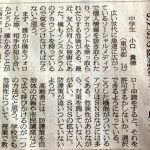Today is the International Day of Multilingualism, chosen because 27th March 196 BC is the date on the famously multilingual Rosetta Stone. Here is information about a key topic in multilingualism at ISB: translanguaging. In a recent Grade 6 Social Studies … Continue reading

March 27, 2024
by ISB Native Language Programs
0 comments






